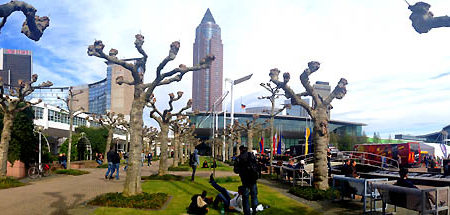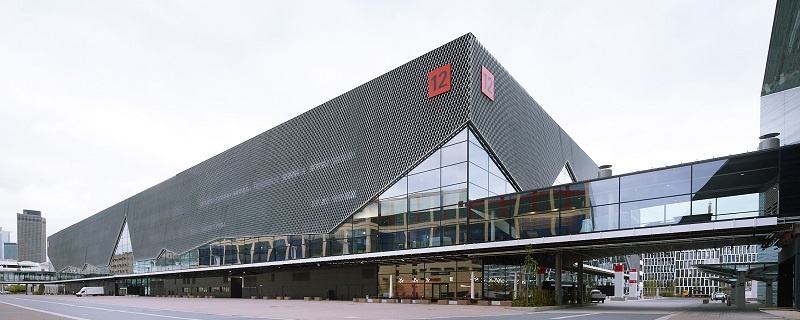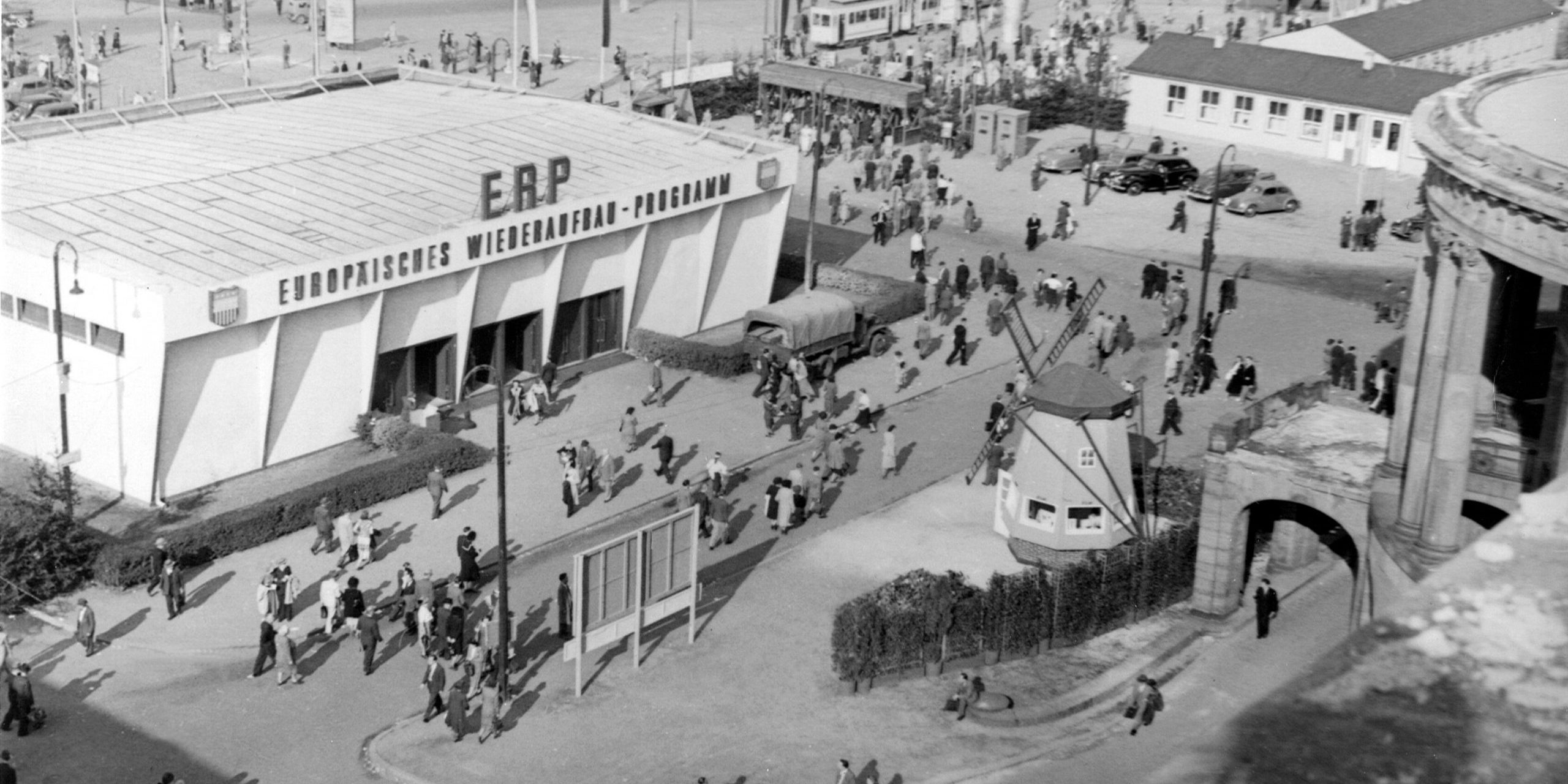On July 11, 1240, Emperor Frederick II granted the city of Frankfurt the privilege of holding trade fairs, thus laying the foundation for a lively trade fair business in the city. This day is regarded as the birth of Messe Frankfurt. Merchants were thus granted the right to escort and a secure legal basis for their business. Only a few decades later, around 1330, the approval of a spring fair followed. This established the principle of two major trade fairs a year, which still exists today and made Frankfurt a central hub for European trade.
From medieval market to international trading platform
The first autumn and spring fairs were characterized by the exchange of goods and raw materials. Traders from Italy, France, the Netherlands and large parts of the Holy Roman Empire came to Frankfurt. Particularly in the late Middle Ages, Frankfurt supplanted other traditional fair locations, such as Champagne, and developed into a leading trading center for luxury goods, books, handicrafts and textiles.
This early internationality laid the foundation for Messe Frankfurt’s role today. With its favorable location in the heart of Europe, situated on the River Main and later perfectly connected by rail, the city was predestined for the exchange of goods and ideas.
Crises, setbacks and new beginnings

People on the outdoor exhibition grounds of Messe Frankfurt with the exhibition tower.
The history of Messe Frankfurt is also a history of crises. As early as 1635, the spring fair fell victim to the Thirty Years’ War and a severe wave of plague. Conflicts and epidemics repeatedly led to interruptions.
The 20th century hit the fair particularly hard. During the Second World War, around 95 percent of the exhibition grounds were destroyed. Buildings such as the Festhalle, which opened in 1909 and was an architectural masterpiece at the time with space for 18,000 people, only survived the bombing with severe damage. After 1945, the arduous reconstruction began and the Frankfurt Book Fair was able to take place again as early as 1949. In the years that followed, it developed into the world’s most important platform for the publishing industry and symbolized a new beginning in the post-war period.
The trade fair as a driving force for the city
“The trade fair is a driving force for the development of our city. Nowhere are trade fair and city history so closely linked as in Frankfurt,” emphasized Frankfurt’s former Lord Mayor Peter Feldmann on the occasion of a trade fair anniversary. In fact, the trade fair industry has had a decisive influence on Frankfurt’s development into an international metropolis.
The architecture of the exhibition grounds reflects the changes: from the historic Festhalle building and the Torhaus in the 1980s to the most recent expansions with Hall 12 and the Kap Europa congress center. Over the past decades, a modern, functional and architecturally striking exhibition center has been created in the middle of the Europaviertel.
Variety of events
Today, Messe Frankfurt is no longer the medieval marketplace of yesteryear, but one of the most important hubs of international trade. Traditional events such as the Frankfurt Book Fair, the Heimtextil, the Automechanika or the Light + Building have a long history at the location. Also the Prolight + SoundEurope’s Home of Event Technology, also attracts international visitors year after year.
The site also offers space for major events, concerts and shows. World-class artists perform in the Festhalle, while trade fairs set the pace for the international economy. This diversity makes Messe Frankfurt unique: it is simultaneously a business, cultural and meeting center.
The caesura caused by Corona
The year 2020 marked a major turning point. The coronavirus pandemic forced Messe Frankfurt to cancel or postpone almost all events – including the long-established Prolight + Sound. Instead, the exhibition grounds were used for other purposes: Frankfurt University retreats were held in Hall 11 and the Festhalle served as a vaccination center.
“The trade fair landscape will change as a result of the coronavirus crisis. Topics such as digitalization and safety will play a central role. However, personal encounters will remain the biggest success factor,” said Wolfgang Marzin, Chairman of the Board of Management of Messe Frankfurt. His words illustrate the challenge of redefining the trade fair as a place for real encounters in an increasingly digital world.
Digitization and new formats

Opening of Hall 12 at Messe Frankfurt
The trade fair company has invested heavily in digital platforms in recent years. Hybrid events, livestreams and digital networking tools complement the physical formats. This is the trade fair’s response to the increased expectations of international exhibitors and visitors who want to get in touch with each other outside of face-to-face events.
At the same time, it is clear that face-to-face meetings remain irreplaceable. The direct exchange, trying out products and the emotional impact of live events cannot be completely replaced by a video conference. The future of the trade fair therefore lies in the combination of physical experience and digital reach.
Sustainability as a leitmotif
In addition to digitalization, sustainability is a central focus. Messe Frankfurt is pursuing ambitious climate targets, focusing on energy-efficient buildings, waste avoidance and sustainable catering concepts. The topic of “green events” is also becoming increasingly important for the events themselves. Visitors, exhibitors and organizers are now paying more attention to ecological standards, as a result of which the trade fair company has developed new concepts and services.
Economic significance
Today, Messe Frankfurt is one of the largest trade fair companies in the world. It is 60 percent owned by the City of Frankfurt and 40 percent by the State of Hesse. With over 2,500 employees, it generates billions in purchasing power for the region every year. According to studies, Messe Frankfurt directly and indirectly secures more than 30,000 jobs in Germany – from trade fair construction to the hotel and catering industries.
Its international orientation is another success factor. Subsidiaries and partner events in Asia, North America and the Middle East ensure that the “Messe Frankfurt” brand has a global presence. This not only strengthens Frankfurt as a business location, but also the international competitiveness of German companies.
A look into the future
After almost 800 years of eventful history, Messe Frankfurt has shown that it can survive crises and reinvent itself time and again. Whether plague, wars, destruction or the pandemic – it has always managed to draw new strength from setbacks.
The next few years will be characterized by three themes:
- Digital transformation with hybrid formats.
- Sustainability to reduce the ecological footprint.
- Internationalization to further expand global reach.
At the same time, the core remains unchanged: personal encounters. People want to exchange ideas, experience products and develop ideas – and Messe Frankfurt has been creating the platform for precisely this since 1240.
From the medieval markets to the modern trade fair company, Messe Frankfurt has undergone a unique development. It is a symbol of change, resilience and innovative strength. Whether it’s the Book Fair, Prolight + Sound or leading international events in the fields of industry, consumer goods or culture – Messe Frankfurt remains one of the most important meeting places for business and society worldwide.






